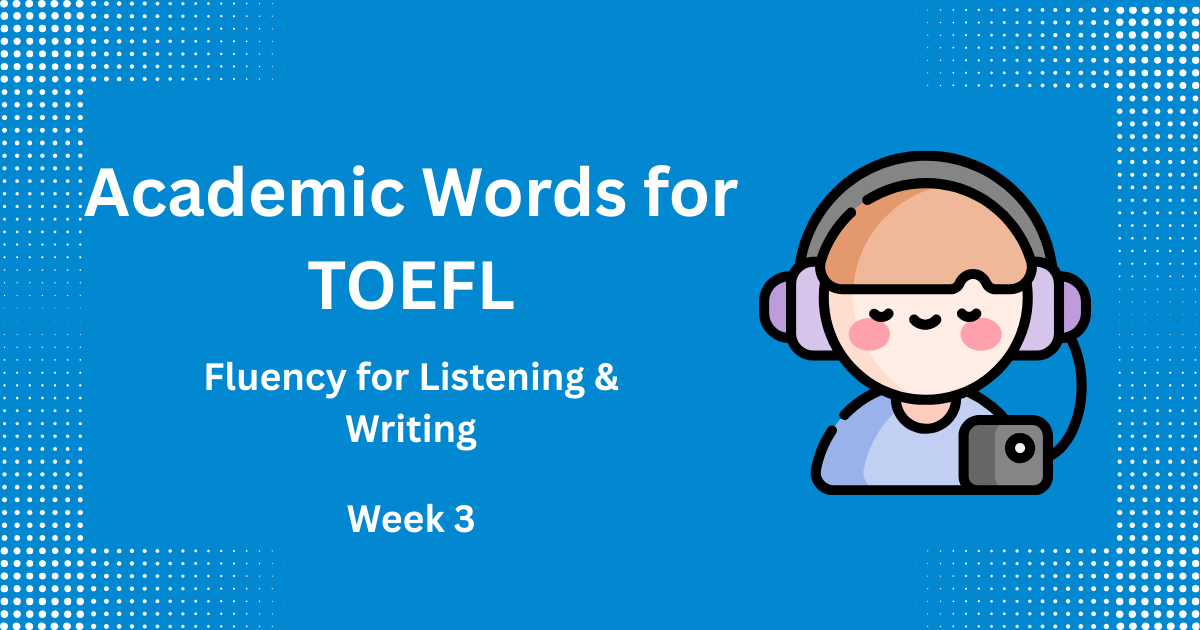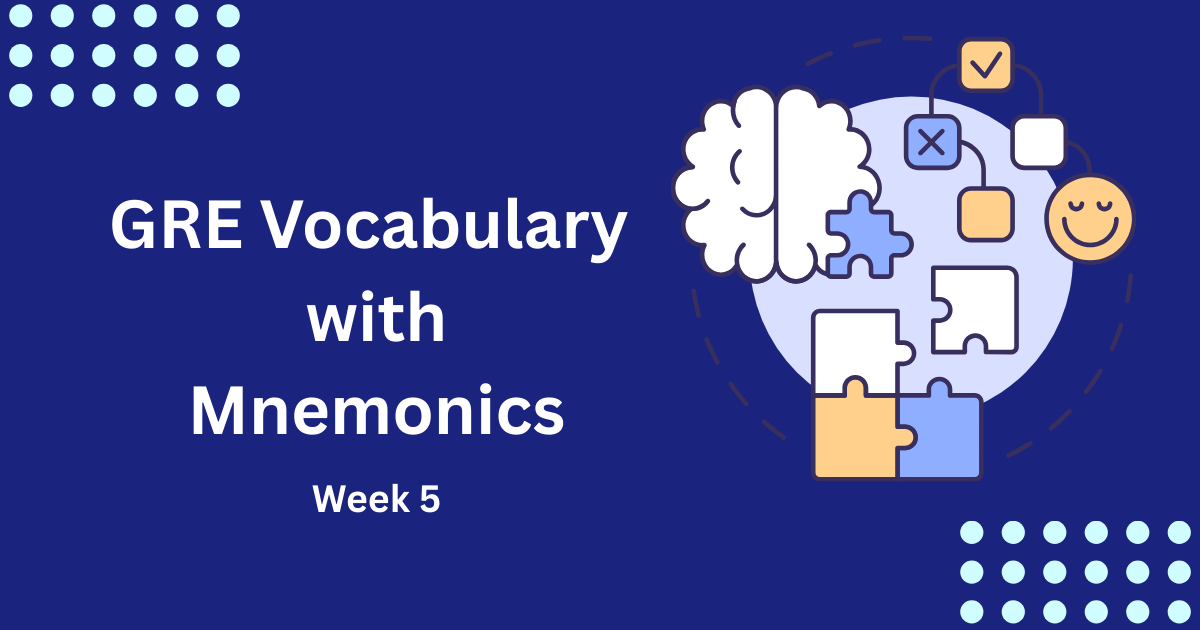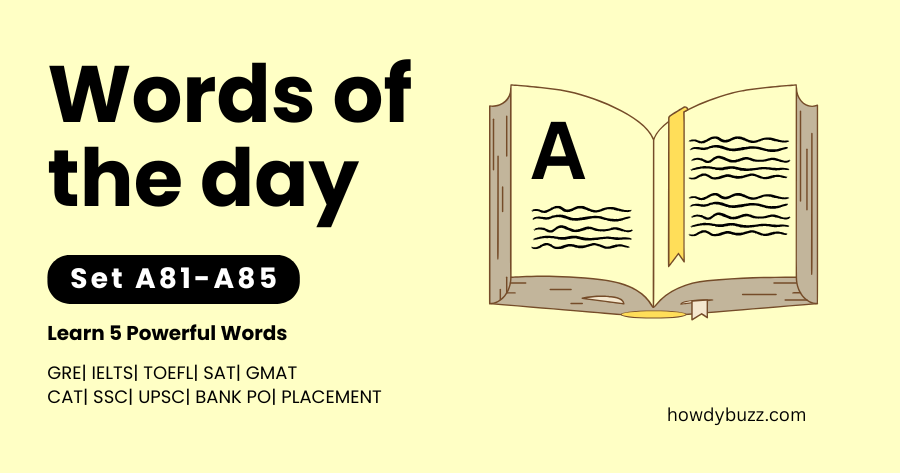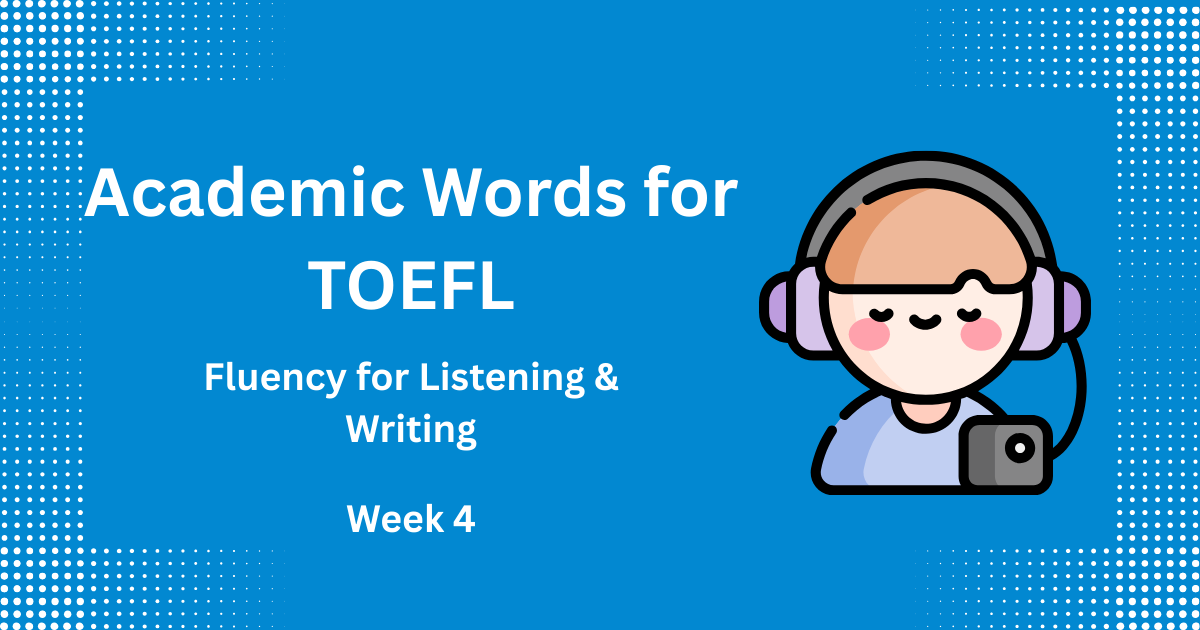📘 Master 30 Advanced TOEFL Vocabulary Words Across Psychology, Art, and Business
Want to speak and write like a native academic on the TOEFL?
This handpicked list of 30 advanced academic words—organized by theme—will help you elevate your Reading, Listening, Speaking, and Writing skills.
Each word includes a precise definition, real-world example, and a pronunciation tip—essential for scoring high in Speaking and Writing tasks.
🔢 Word List with Usage & Tips
🧠 Psychology & Human Behavior
- Adulate
• Meaning: To excessively praise or flatter
• Example: Fans adulated the singer after the performance.
• Pronunciation: /ˈæd.jʊ.leɪt/ - Adulation
• Meaning: Excessive admiration or praise
• Example: He lived for public adulation.
• Pronunciation: /ˌæd.jʊˈleɪ.ʃən/ - Affable
• Meaning: Friendly and easy to talk to
• Example: The professor was known for being affable.
• Pronunciation: /ˈæf.ə.bəl/ - Affectation
• Meaning: Artificial behavior meant to impress
• Example: Her British accent was merely an affectation.
• Pronunciation: /ˌæf.ekˈteɪ.ʃən/ - Aggrieve
• Meaning: To cause resentment or distress
• Example: The workers felt aggrieved by the unfair policy.
• Pronunciation: /əˈɡriːv/ - Aghast
• Meaning: Filled with shock or horror
• Example: She was aghast at the crime scene.
• Pronunciation: /əˈɡɑːst/ - Agile
• Meaning: Mentally or physically quick
• Example: She was agile on both the stage and in conversation.
• Pronunciation: /ˈædʒ.aɪl/ - Agitate
• Meaning: To emotionally disturb or excite
• Example: Protesters agitated the crowd with speeches.
• Pronunciation: /ˈædʒ.ɪ.teɪt/ - Agog
• Meaning: Highly excited or eager
• Example: Children were agog with anticipation.
• Pronunciation: /əˈɡɒɡ/ - Agonize
• Meaning: To suffer extreme mental pain
• Example: He agonized over the difficult decision.
• Pronunciation: /ˈæɡ.ə.naɪz/
🎨 Art, Literature & Aesthetics
- Adorn
• Meaning: To decorate or beautify
• Example: The walls were adorned with art.
• Pronunciation: /əˈdɔːn/ - Adroit
• Meaning: Skillful, especially with hands or mind
• Example: Her adroit handling of the situation impressed everyone.
• Pronunciation: /əˈdrɔɪt/ - Aesthetic
• Meaning: Related to beauty or art
• Example: The painting had aesthetic appeal.
• Pronunciation: /iːsˈθet.ɪk/ or /esˈθet.ɪk/ - Aestheticism
• Meaning: A focus on beauty or art for its own sake
• Example: Aestheticism dominated 19th-century art movements.
• Pronunciation: /esˈθet.ɪ.sɪ.zəm/ - Aerie
• Meaning: A high nest or secluded place; often metaphorical
• Example: The writer composed her poetry in a mountaintop aerie.
• Pronunciation: /ˈeə.ri/
⚖️ Law, Society & Politics
- Adulterate
• Meaning: To contaminate or make impure
• Example: The company was fined for adulterating food products.
• Pronunciation: /əˈdʌl.tə.reɪt/ - Adversarial
• Meaning: Involving conflict or opposition
• Example: The debate had an adversarial tone.
• Pronunciation: /ˌæd.vəˈseə.ri.əl/ - Adverse
• Meaning: Harmful or unfavorable
• Example: The medication had adverse effects.
• Pronunciation: /ˈæd.vɜːs/ - Adversity
• Meaning: Difficulties or hardship
• Example: She succeeded despite great adversity.
• Pronunciation: /ədˈvɜː.sə.ti/ - Advocacy
• Meaning: Public support for a cause
• Example: She is involved in environmental advocacy.
• Pronunciation: /ˈæd.və.kə.si/ - Advocate
• Meaning: To support a cause; a person who supports
• Example: He advocates for equal education.
• Pronunciation: /ˈæd.və.keɪt/ (verb), /ˈæd.və.kət/ (noun)
🧪 Science, Philosophy & Religion
- Adumbrate
• Meaning: To foreshadow or suggest vaguely
• Example: The poem adumbrated the coming revolution.
• Pronunciation: /ˈæd.əm.breɪt/ - Agnostic
• Meaning: One who is unsure about God’s existence
• Example: He identified as agnostic, not atheist.
• Pronunciation: /æɡˈnɒs.tɪk/ - Advent
• Meaning: Arrival of a significant event
• Example: The advent of the internet changed everything.
• Pronunciation: /ˈæd.vent/ - Adventitious
• Meaning: Happening by chance or not essential
• Example: The meeting was adventitious but productive.
• Pronunciation: /ˌæd.vənˈtɪʃ.əs/
💼 Economics & Business
- Affluent
• Meaning: Wealthy
• Example: The city’s affluent neighborhoods are well-maintained.
• Pronunciation: /ˈæf.lu.ənt/ - Aggrandize
• Meaning: To increase power or wealth
• Example: The CEO aggrandized his position through mergers.
• Pronunciation: /əˈɡræn.daɪz/ - Aggregate
• Meaning: Total or combined
• Example: The aggregate cost was higher than expected.
• Pronunciation: /ˈæɡ.rɪ.ɡət/ - Affinity
• Meaning: A natural liking or connection
• Example: She has an affinity for numbers and logic.
• Pronunciation: /əˈfɪn.ə.ti/ - Agitate (repeated above)
• Meaning: To provoke or stir public attention
• Example: The activist agitated for change.
• Pronunciation: /ˈædʒ.ɪ.teɪt/
🎯 Practice Questions (TOEFL Style)
1. What best completes the sentence?
“The ________ effects of pollution are becoming impossible to ignore.”
A) Advocacy B) Adventitious C) Adverse D) Affable
Answer: C) Adverse
2. Which word means ‘to increase in power or influence’?
A) Agog B) Aggrieve C) Aggrandize D) Aggregate
Answer: C) Aggrandize
3. Which term is often used to describe extreme admiration?
A) Affable B) Adulation C) Acrid D) Adage
Answer: B) Adulation
🎓 TOEFL Tip of the Day
Advanced academic words like adumbrate, aestheticism, advocacy, and aggregate help showcase a formal tone in your TOEFL Writing and improve clarity in your Speaking. Use them wisely for a higher score!
📅 Download Flashcards
Get all 30 words from this post in a printable PDF with pronunciation and example usage.
👉 Download Master Flashcards A60 to A90 here
📚 Related TOEFL Resources
• 30 Academic Vocabulary Words to Boost Your TOEFL Score – Psychology & Academic Skills
• 30 Academic Vocabulary Words to Boost Your TOEFL Score – Psychology, Science & Law Themes








One Comment